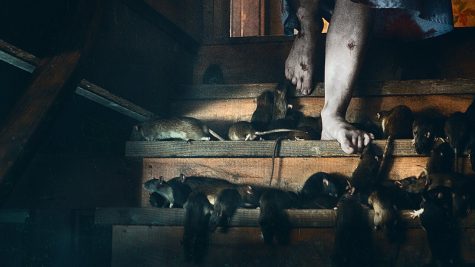‘1922’ will gnaw at you long after viewing

For today’s Halloween review, I’ll be taking a look at the 2017 Netflix original, “1922.” It is one of many films adapted from Stephen King books, and is – in my view – stylistically distinct from the other five King adaptations I’ve watched. The film has a relatively simple premise, but a very artsy execution. There are three main characters to the plot. First, there is Wilfred James (Thomas Jane), narrator of this film and unloving husband. Next, there is Hank (Dylan Schmid), Wilfred’s 15-year-old son and eventual accomplice. Finally, there is Arlette (Molly Parker), Wilfred’s deceased wife, who had wanted to leave rural life and take sole custody of Hank.
In the first act of the film, the murder of Arlette sets up the plot. Arlette seems to be set on ruining Wilfred’s life, in the sense that she is going to sell his farm land (“a man’s pride is his land,” as Wilfred says at the beginning of this film) then move to the city, and if Wilfred doesn’t like that, he’s losing custody of Hank. To Wilfred, city life will be miserable and stripping his life apart. Hank concurs with this sentiment, as he would be leaving behind both his love interest at school and the land.
Wilfred manipulates Hank’s desires to persuade him to be an accomplice in the murder of Arlette. To Wilfred, it would solve all of their problems. He knew he couldn’t beat her lawyers in the fight to take his land and his son, so to him, this was the only option. All of these events happen around the first thirty minutes, though.
Throughout the film’s beginning, I found myself asking, “How is this a Netflix original?” Every part of this takes itself extremely seriously. There is no comedic element to any character. There is no extremely quotable moment either, such as the line “We all float down here,” from another King adaptation, “It.” In fact, the only time we see any humorous aspect in the film at all is when Wilfred is extremely hostile to a lawyer. It was not what I was expecting in comparison to other Netflix specials I have seen.
Overall, however, this is the best story of a character’s devolution I have ever watched. Shakespeare wishes he could have adapted this into a play.
As for the theme of this film, I believe a perfect job was done to make it far from cheap horror. They made the film terrifying without any of the characters ever fearing for their lives.
See, “1922” is a story of trauma. The killing at the beginning of the film was never to paint the killers as monsters. Rather, it was to show the toll murder takes on two people. After the killers dump their family member in a well, they see the only horror the audience can be sure is not just a product of trauma: rats swarming Arlene’s corpse, crawling out of her mouth and devouring parts of their former loved one’s body.
There’s an intriguing scholar and fear enthusiast I know of named R. Michael Fisher who would call the theme of this film “fearosis.” The word is a portmanteau of fear and neurosis that he defines as “the pathological state of chronic excess fear at the base of neurosis and/or psychosis.” This perfectly encapsulates the situation Wilfred is in, as well as every scary moment in the film. There is not a single time where there is a sudden, spooky murder or a threat of instant harm. The only horror is from seeing the world through Wilfred’s delusions – which could be seen as a narrative way of depicting psychosis.
After the murder of Arlette, several key events are made dubious based on the fact that the story is told through an unreliable narrator. Although nearly every event takes place on Wilfred’s farm (even when the viewer is seeing situations where Wilfred isn’t there), much is depicted as delusions stemming from Wilfred having seen his dead wife.
The most important of these dubious delusions are rats.
“1922” explores the idea of rats not as a phobia, a part of the environment or antagonists, but as a theme.
When I was younger, I often pondered the power of rats. If there was ever a “Rise of the Planet of the Apes”-style takeover conducted by rats instead, they would have some unique advantages. Most of these advantages are scarier in theory than they ever would be practically, though. “1922” explores that in some unique ways:
Rats crawling everywhere as far as pipes from a well could reach. Rats tormenting peaceful cows for seemingly no other reason but to spawn pain and suffering. Rats chewing through any possible barriers, claiming a rural home for their own.
Here’s the not-so-secret secret, though: all of these actions are completely possible. At the same time, all of them could be manifestations of psychosis or something similar. Of course, Wilfred seeing a living corpse of his wife is a delusion, but when a rat seems to prey on his every fear and guilt, what about that? In any sense, this isn’t a supernatural tale; far from it. Instead, it just seems as such when we see the foreign reality of the trauma suffered in a life ruined by the act of murder.
This “foreign reality” manifests in ways that may seem scary to the viewers, but even they couldn’t truly comprehend the lifelong trauma Wilfred is going through. Tragedy isn’t always scary and it can be difficult to make it so, but “1922” is not a story to be scared by, but rather to be worried. The film feels like living through Wilfred, and it is a pitiable experience.
I may have covered my interpretation of the theme of “1922,” but I haven’t even come close to saying all I want to say about it. That’s because I recommend the film to you, reader.
Edited by Justin Shepard
Your donation will support the student journalists of Washburn University. Your contribution will allow us to purchase equipment and cover our annual website hosting costs.













